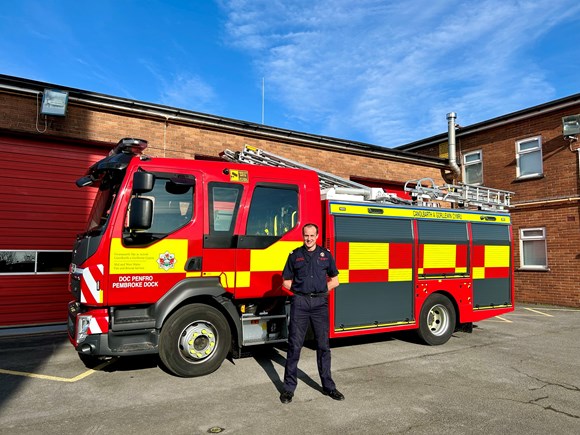ON Friday, February 3 an off-duty Mid and West Wales Fire and Rescue Service firefighter administered lifesaving CPR to a gentleman experiencing a cardiac arrest.
Lee Murray, a Crew Manager at Pembroke Dock Fire Station, was enjoying his regular morning swim at Pembroke Leisure Centre when he noticed some commotion at the side of the swimming pool. On leaving the pool to see what was happening, Lee saw lifeguards assisting a gentleman who had collapsed and was experiencing a cardiac arrest.
Lee immediately took control of the situation and directed lifeguards to retrieve a defibrillator and to call for an ambulance. In the meantime, Lee administered ‘hands-only CPR’ to the casualty and once the defibrillator arrived, he attached it to the casualty in order to administer a shock. By the time the ambulance arrived, the patient had regained consciousness.
On Lee’s actions, Pembroke Dock Station Watch Manager, Phil Barry, said: “I have no doubt that Lee’s actions and quick-thinking helped save the patient’s life. Following the incident, the patient spent a week in hospital and is expected to make a full recovery and he has expressed his deep gratitude to Lee for saving his life.”
Station Manager, Kevin Hughes, said: “The way in which Lee was able to take control of the situation with confidence and help save this patient’s life is testament to the continual training he and the rest of the Service’s crews receive, as well as the annual Fire Trauma assessments every operational member of staff attends.”
Coincidentally, this incident occurred during the Welsh Ambulance Services Trust’s annual month-long ‘Defibuary’ campaign, which is designed to raise public awareness of the importance of bystander cardiopulmonary resuscitation (CPR) and defibrillation.
According to the British Heart Foundation, only one in ten people survive an out-of-hospital cardiac arrest in the UK, and it can happen to anyone, at any age, so knowing how to do CPR and how to use a defibrillator can improve the chance of survival.
Fiona Maclean, the Trust’s Patient Experience and Community Involvement Manager and Defibuary Lead, said: “Immediate CPR and defibrillation can more than double the chance of survival, February is all about education and taking away the fears people may have in dealing with cardiac arrests.
You don’t need to be trained in CPR, as a 999-call handler will talk you through exactly what to do, but knowing how to perform CPR can help you remain calm in an emergency.”
If you see someone having a cardiac arrest, phone 999 immediately and start CPR.


















